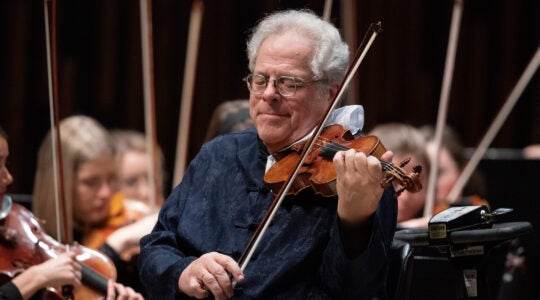Two new books tell the compelling stories of three Jewish lives of dramatic change.
Both Abby Stein’s “Becoming Eve: My Journey from Ultra-Orthodox Rabbi to Transgender Woman” (Seal Press) and Mimi Lemay’s “What Will We Become: A Mother, A Son, and A Journey of Transformation” (Houghton Mifflin Harcourt) are uncommon memoirs “about becoming” (Stein) that involve monumental life-altering choices regarding religious and gender identification. Stein narrates her own life experience, from childhood to early adulthood, and Lemay weaves together her own story and that of her transgender young son.
Stein and Lemay — both now outspoken advocates for transgender rights — felt there was, in fact, no other choice than the groundbreaking paths they ultimately pursued. Their stories illuminate the ongoing struggle of people who don’t relate to the gender they were assigned to lead authentic lives. Both express gratitude for where they are today, including the events that brought them here.
A 10th-generation descendent of the Baal Shem Tov, Stein opens her debut book with a quote from him, “Let me fall if I must fall. The one I will become will catch me.”
A trans activist who came out as a woman in 2015 and was named by The Jewish Week to its 2016 “36 Under 36” young leaders list, Stein grew up in a Yiddish-speaking enclave in Williamsburg, Brooklyn. She is one of 13 siblings — the first-born son after five daughters — in a family closely related to several rabbinic dynasties, ever aware of its royal rabbinic pedigree. Some women in the family even kept the tradition of wearing a tiara as part of their head covering.
From a very early age, Stein didn’t fit the mold: Stein liked pink, wanted a doll house rather than a truck, wailed at his “upsherin” at age 3 when his hair was shorn for the first time, leaving payos, and avoided the rough play that boys enjoyed in the school playground.
In an interview in Manhattan with The Jewish Week, Stein recalls always knowing that she was a girl. Every night, as a little boy, she would go to sleep praying that she would wake up in the morning as a girl: “I know that you can do anything, and nothing is too hard for you, so please, I am a girl, why can’t I look like a beautiful little girl.”
A gifted student, Stein excelled even as she was thrown out of several schools for misbehaving. As a teenager, Stein was sent to see therapists; the parents may have thought their son was gay but they
didn’t know anything about being trans. At the Viznitz Yeshiva in upstate South Fallsburg, she found her way, studying 11 hours a day and sometimes through the night. There, she had a secret love affair with another boy. Later on, she received rabbinical ordination. Stein found relief upon studying a 16th-century kabbalistic text about how it can be possible for a female soul to enter a male body.
As is the community’s tradition, her marriage was arranged. In their one meeting before their wedding, she and her fiancé felt in many ways a good pair, laughing together. But Stein, then 18, had to keep her desires to be the bride secret. The couple had a son one year after their wedding. Stein hoped that in marriage, the feelings of being a woman would go away, but that was not the case.
Most of the book takes place before Stein began the process of leaving the marriage, community and transitioning. That she barely knew English for most of her life is striking, for the memoir is written with grace and skill. She explains that she has been writing — in Yiddish and Hebrew — since age 6. In an epilogue, Stein jumps ahead a few years to describe a meeting with her father and Rabbi David Ingber of Romemu — where Stein has found a spiritual home — when she says, “Tati, I am a girl.”
That was the last time she saw or spoke to her father, and she speaks only with a few of her siblings. She declines to talk about her son and former wife, wanting to keep their lives private.
When she left the chasidic world, the organization Footsteps was a lifesaver. She has been studying at Columbia University and is thinking of combining her final courses with a graduate degree. She’s interested in public policy, perhaps even public office, or perhaps will pursue chaplaincy. Stein has organized with others a group called Sacred Space, a feminist interreligious group. Now, she is dating a woman rabbinical student.
When we met, she was just back from a protest at City Hall with other progressive Jews and civic leaders supporting bail reform, and a few days earlier helped lead several progressive groups across the Brooklyn Bridge in the “No Hate, No Fear” march.
About five years ago, she took on candlelighting for Shabbat and hasn’t missed a week. “I needed something to ground me.”
As for God, she says, “I don’t think the God version I grew up with exists, the bogey man in the sky, who is going to get really angry if I switch on the light on Shabbat — I do not relate to that in any way. If you’re going to talk about a God that is divine, that seems a lot more like something I can relate to.”
In her advocacy, Stein would like to see the Jewish community “send a message to some of the most vulnerable people that this is an open community and you will be welcome.”
Coming to life
As a mother, Mimi Lemay recognized her child’s pain, that while born a girl, the child identified as a boy before even turning 3.
While there is little research on how to raise a transgender child, Lemay sought out medical experts and compassionate educators, and she and her husband protected and supported “Em” (a pseudonym they chose), affirming his identity. He was able to begin kindergarten with a new identity and new name, Jacob.
“I saw a child who was receding into the darkness come to life,” Lemay says in an interview with The Jewish Week. She is in awe of her son’s courage and strength. Her own determination and insight are awesome as well.
“I hope that the book presents a glimpse, through my eyes, into our lives going through that process. Sometimes you just need to be invited in.”
For Lemay, recognizing her child as transgender brought back her own pain of feeling “other” at an early age, that she didn’t fit into the ultra-Orthodox world in which she was raised.
The well-written and powerful memoir unfolds in alternating chapters, with parallel moments between Jacob’s story of transition, and Lemay’s story of coming of age as an observant daughter even as she rebelled, attending the distinguished Gateshead seminary after high school, becoming increasingly frustrated with women’s limited learning opportunities and eventually breaking away from the community and from her faith.
Lemay’s mother, very much part of the memoir, remains ultra-Orthodox, and mother and daughter have found ways to live with the contradictions between their lives.
Embracing social justice and activism as Jewish values, Lemay is still in the process of reconciling her Jewish faith in a way that lets her connect to her past and to the LGBTQ community. While she no longer keeps Shabbat, she hopes that her three children — Jacob is in the middle of two sisters — always feel connected to the Jewish faith and people.
Lemay, who serves on the Human Rights Campaign’s Parents for Transgender Equality Council, hopes that through the book, she’ll help shape public discourse on gender identity in young children.
She writes, “Children like Jacob have much to teach us about authenticity — about who we truly are, beneath and beyond our skin and bone. Until they are no longer punished for their nature, I will continue to speak out in the hopes that I can leave them a worthier, more accepting world.”
She would like to see Jewish schools devote energy to inclusion and teach about transgender and non-binary people — “we all share some aspect of tzelem Elohim, the image of God, and are all precious and have the right to be protected.” She adds, “I hope that in 10 years our story will be commonplace, that everyone will acknowledge those who are different in their midst.”
The New York Jewish Week brings you the stories behind the headlines, keeping you connected to Jewish life in New York. Help sustain the reporting you trust by donating today.




